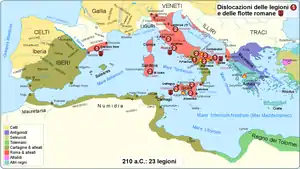Battle of Numistro
The Battle of Numistro was fought in 210 BC between Hannibal's army and one of the Roman consular armies led by consul Marcus Claudius Marcellus. It was the fourth time they met in a battle. Previous encounters were located around the walls of Nola (Campania) in 216, 215, and 214 and had been favourable for the Roman side.
| Battle of Numistro | |||||||
|---|---|---|---|---|---|---|---|
| Part of the Second Punic War | |||||||
 Strategic situation in 210 BC | |||||||
| |||||||
| Belligerents | |||||||
|
|
| ||||||
| Commanders and leaders | |||||||
| Hannibal | Marcus Claudius Marcellus | ||||||
| Strength | |||||||
| 20,000 | |||||||
Antecedents
In the early months of the 210 BC, the city of Salapia (Apulia) was betrayed to the Romans, and the Carthaginians lost an important garrison of cavalry.[2] After this, Hannibal retreated to Brutium and Marcellus conquered the towns of Maronea and Meles in Samnium. Shortly thereafter, the Carthaginian general returned to Apulia and defeated proconsul Gnaeus Fulvius Centumalus Maximus in the Second Battle of Herdonia.[3] Then Marcellus informed the Senate he would intercept and give battle against the Carthaginian general to restore Roman honour. His was the only full strength Roman army in the south of Italy at the moment (there was another minor army in Capua with one legion of 5,000 men and an allied wing of 7,500 soldiers), so the consequences of a defeat could have been disastrous for the Roman side and its attempt to counter the invasion in that part of the country. Marcellus moved from Samnium and intercepted the Carthaginian army in Numistro, a town north-east of Lucania. The Roman army encamped in the plain while the Carthaginian camp was on a hill.[4] Numistro was close to Muro Lucano, on a route that the Carthaginianarmy used between Northern Apulia and Brutium.
The Battle
According to Livy, the fight started early in the morning. Marcellus put his "I Legion" and "Right Alae Sociorum" in the front line.[5] During the combat both units were relieved by the "III Legion" and "Left Alae". Punic forces described by Livy included Balearic slingers and Spanish infantry, as well as elephants. The battle lasted one day but after a hard fight the result was inconclusive, since it ended due to nightfall,[6] with Hannibal retreating to Apulia the next day. Though Goldsworthy counts it as a marginal Roman victory.[1] Marcellus left his injured soldiers at the town to recover and followed Hannibal to hunt him in that territory, having minor engagements until the end of that year's campaign. Frontinus tells that the battle was won by Hannibal thanks to the surrounding terrain.[7]
Both generals met again in battle the following year in Canusium. Numistro and Canusium were probably separated in time by no more than six months, as the former happened during the last period of the 210 BC consulship while the latter was in the early months of 209 BC.
Sources
- Livy "Ab Urbe Condita" XXVII,2
- Frontinus "Stratagems" II,II,6
- Plutarch “Life of Marcellus”, 24
References
- Goldsworthy, Adrian Keith. (2004). In the name of Rome : the men who won the Roman Empire. London: Phoenix. pp. Chapter: The Shield and Sword of Rome, Section: A HERO OF THE OLD SCHOOL–MARCUS CLAUDIUS MARCELLUS. ISBN 0-7538-1789-6. OCLC 61301256.
- Titus Livius, Ab Urbe Condita, XXVI,38,23
- Titus Livius, Ab Urbe Condita, XXVII,1,5
- Titus Livius, Ab Urbe Condita, XXVII,2,5
- Titus Livius, Ab Urbe Condita, XXVII,2,8
- Titus Livius, Ab Urbe Condita, XXVII,2,12
- Frontinus, Stratagems, II,2,6
